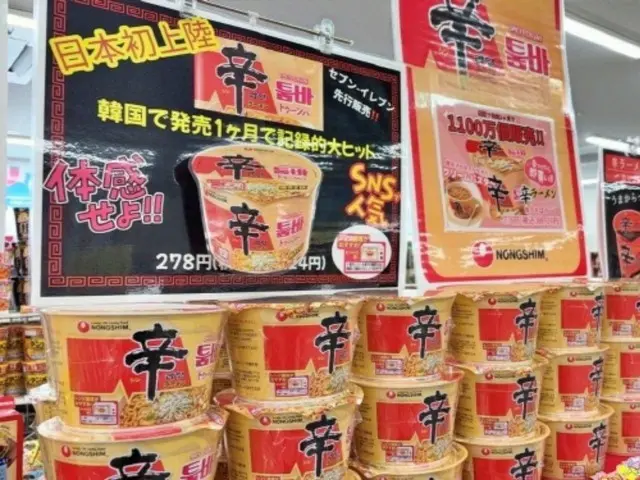The prices of major processed foods, such as ramen and coffee sticks, which are typical foods for the common people, have risen sharply.
It is said that ordinary people's income in the January-March period decreased compared to the same period last year, and there are analyses that suggest that rising prices are placing an even heavier burden on households.
According to industry insiders, prices increased last year due to pressure from the government to suppress prices.
Food manufacturers, which had been hesitant to raise prices, took advantage of the confusion following the declaration of martial law in December last year to raise product prices one after another.
Despite criticism from the government, the government appeared to have achieved some success. However, the domino effect of price hikes among companies during this politically turbulent time is out of control.
Following January and February, the number of cases has increased significantly since March and has not stopped until recently, just before the presidential election.
"It will be difficult to get a response," he said. Four days before the presidential election, Dongseo Foods cut the price of "Maxim Mocha Gold," which has an overwhelming share of the domestic stick coffee market, by 9%.
This is the second price hike just six months after the 9.5% hike in November last year. The price of "Mocha Gold Mix (180 pieces)" has risen to about 35,000 won at major supermarkets, up 60% from the previous year.
Lotte Wellfoods has also raised the prices of dozens of snacks and ice cream items twice in the last eight months, with Pepero now in the 2,000 won range.
" prices rose by more than 40 percent. Nongshim raised the prices of its soups on the same day, following the increase in its ramen and snacks. Binggrae increased the prices of its ice cream and beverages by just 2 percent.
In response, the Ministry of Agriculture, Forestry and Fisheries is working to calm the situation. The ministry has recently released explanatory materials for three consecutive days, stating that "the food industry is taking control of the market."
"There is no clear reason for the price hike to coincide with the general election," he said. He also refuted the criticism that price control had been relaxed, saying, "The government and the industry are adjusting the items, range and timing of price hikes."
However, the price rise that consumers are actually feeling is even more rapid. The Korea Consumer Agency has found that the prices of major processed foods have risen significantly over the past year.
In April of this year, the prices of 24 of the 34 food items most frequently purchased by consumers increased by an average of 7.1% compared to a year ago.
In terms of the rate of increase by item, fish paste products (massal) had the highest rate of increase at 50%,
This was followed by stick coffee at 34.5%, gochujang at 25.8%, cola at 22.6%, cup rice at 22.2%, and curry at 18.0%.
Other items that saw price increases of around 10% include sesame oil (13.3%), instant porridge (13.2%), and soy sauce (12.4%).
Compared to the previous month, prices of stick coffee increased by 14.4%, ham by 8.9%, sausages by 6.4%, and curry and instant noodles by 4.3% each.
These price trends are calculated by collating data on the actual prices at which consumers purchased goods at major supermarkets and other retailers, and are affected by factors such as manufacturer price hikes and discount campaigns by retailers.
According to the Consumer Price Trends report released by the Statistics Bureau in April this year, processed food prices rose by 4.1%, far exceeding the overall consumer price index growth rate (2.1%) and reflecting the overall price
This was the largest increase in 16 months since December 2023 (4.2%).
This will be the most urgent issue to be addressed if a new administration is formed.
A number of people cite "price stability" as an issue. In a recent survey by the Korea Business Association, six in ten Koreans cited price stability as their top priority for public welfare.
When asked what policy the government should pursue to stabilize prices, the most common answer given was "stabilizing the prices of agricultural and livestock products and daily necessities (35.9%)."
However, many people believe that it will not be easy to stop the trend of rising prices even after the new administration takes office.
2025/06/02 05:52 KST
Copyrights(C) Herald wowkorea.jp 104

